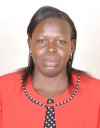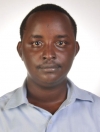Musa Kayondo
ID:
|
PELVIC ORGAN PROLAPSE IN SOUTHWESTERN UGANDA: PATTERNS, IMPACT ON QUALITY OF LIFE, SURGICAL OUTCOMES AND THE PREDICTING FACTORS, OF PATIENTS ATTENDING MBARARA REGIONAL REFERRAL HOSPITAL
REFNo: HS368ES
1. To determine the patterns of POP in the Gynecology department of MRRH.
2. To establish the quality of life (physical, social, emotional and sexual function) before and after surgery among women with POP at MRRH.
3. To determine the outcomes of surgical treatment and related prognostic factors of POP at MRRH.
|
Uganda |
2019-05-07 |
2022-05-07 |
Medical and Health Sciences |
|
Degree Award |

|
Katia Peterson
ID:
|
A quasi-experimental study of Interpersonal Group Therapy (IPT) treatment attribution on decreasing depression severity among depressed women in Iganga District, Makuutu Sub County and Mukono District, Kimenyedde Sub Counties
REFNo: SS297ES
General objective
To establish a baseline prevalence of depression and determine the period and treatment effects of depression severity between depressed women in Iganga (Makuutu Sub County) and Mukono District (Kimenyedde Sub Counties).
Specific objectives
1. Determine the prevalence of depression in Makuutu Sub County (Iganga) and Kimenyedde Sub Counties (Mukono).
2. Determine the change in depression severity, as measured by the PHQ-9, within control subjects at six months and one year follow up.
3. Determine the change in depression severity, as measured by the PHQ-9, between control and treatment subjects at six months and one-year follow up.
4. Determine the change in well-being as measured by the “Well-being Indicator Survey†within control subjects and between control and treatment subjects at six months and one year follow up.
|
USA |
2019-05-07 |
2022-05-07 |
Social Science and Humanities |
|
Non-degree Award |

|
NICHOLAS BARI NDAHURA BARI
ID:
|
EFFECTIVENESS OF NUTRITION EDUCATION ON GLYCAEMIC CONTROL IN PEDIATRIC TYPE 1 DIABETES MELLITUS PATIENTS IN UGANDA
REFNo: HS186ES
1. To assess the level of knowledge of nutrition management of T1DM among caregivers of T1D children (3-12 years) at selected T1DM clinics in Uganda.
2. To determine the dietary intake and adequacy of T1D children (3-12 years) at selected T1DM clinics in Uganda.
3. To develop a nutrition education training module for caregivers and T1D children (3-12 years) at selected T1DM clinics in Uganda.
4. To determine the effectiveness of nutrition education on HbAlc levels, knowledge of nutrition management of T1DM and dietary practices among caregivers and T1D children (3-12 years) at selected T1DM clinics in Uganda.
|
Uganda |
2019-04-30 |
2022-04-30 |
Medical and Health Sciences |
|
Degree Award |

|
Isaac Kimbowa
ID:
|
ANTIMICROBIAL STEWARDSHIP PRACTICES AND QUALITY OF ANTIBACTERIAL USE IN CHILDREN UNDER-FIVE IN SELECTED HEALTH FACILITIES IN UGANDA
REFNo: HS339ES
1. To determine the structure and functional roles of MTCs in optimizing antibacterial use in management of childhood infections in under-five children in selected RRHs and PNFP health facilities in Uganda (sub-study I).
2. To determine stewardship practices guiding optimizing antibacterial use in management of infections in under five children in selected Health facilities in Uganda (sub-study II)
3. To determine extent of off-label and unlicensed use of antibacterial among children -five in paediatrics wards of selected RRHs and PNFPs in Uganda (Study III)
4. To determine the extent of antibacterial exposure to neonates during perinatal period among women delivering in selected regional referral hospitals in Uganda (Study IV).
|
Uganda |
2019-04-24 |
2022-04-24 |
Medical and Health Sciences |
|
Degree Award |

|
Julia Downing
ID:
|
Children’s, Adults and Health Professionals Understanding Illness, Death and Dying in Uganda
REFNo: HS276ES
The study aims to gain an understanding of children, adults and health professionals understanding of illness, death and dying in order to inform the provision of palliative care services in Uganda. The objectives of the study are to understand the following questions:
I. What are Ugandan adults understanding of illness, death and dying?
II. What are Ugandan children’s understanding of illness, death and dying?
III. What is the understanding of Ugandan health professionals with regards to illness, death and dying?
|
UK |
2019-04-16 |
2022-04-16 |
Medical and Health Sciences |
|
Non-degree Award |

|
Adam Hewitt Smith
ID: UNCST-2019-R001658
|
A cluster randomised trial to determine whether increased postoperative surveillance of adult African surgical patients reduces postoperative mortality
REFNo: HS298ES
Primary objective - To determine whether increased postoperative surveillance reduces in-hospital mortality in high-risk adult surgical patients aged 18 years and over in Africa.
Primary outcome measure - In-hospital mortality, censored at 30 days if the patient is still alive and in-hospital.
Secondary objective - To determine whether increased postoperative surveillance reduces the incidence of the composite of severe in-hospital complications and mortality in high-risk adult surgical patients aged 18 years and over in Africa.
Secondary outcome measure - Composite of severe in-hospital complications and mortality, censored at 30 days if the patient is still alive and in-hospital.
|
UK |
2019-04-16 |
2022-04-16 |
Medical and Health Sciences |
|
Non-degree Award |

|
miriam nantamu
ID:
|
Biosciences in nursing education: assessment of the level of explicit knowledge on antibiotic resistance (ABR) among preregistration nursing students in Uganda.
REFNo: HS313ES
Specific objectives
1. To assess the current level of knowledge on ABR among 3rd and 4th year nursing pre-registration nursing students in Uganda.
2. To identify the factors associated with the current level of bioscience knowledge among 3rd and 4th year pre-registration nursing students in Uganda.
|
Uganda |
2019-04-16 |
2022-04-16 |
Medical and Health Sciences |
|
Degree Award |

|
Sabine Haller
ID:
|
Species Identification of Non-Tuberculous Mycobacteria in the Ugandan Population
REFNo: HS330ES
Primary Objective:
To describe the non-tuberculous mycobacteria (NTM) species isolated in the Ugandan population.
Secondary Objective:
To describe patient characteristics and outcomes.
|
Switzerland |
2019-04-16 |
2022-04-16 |
Medical and Health Sciences |
|
Non-degree Award |

|
Anna Agnes Ojok Arach
ID:
|
Perinatal death: risk factors, postpartum depression, lived experiences and cultural perspective in lira, Uganda
REFNo: HS356ES
The study has the following objectives:
1. To determine the incidence and risk factors of perinatal deaths in Lira,
2. To examine the association between perinatal death and postpartum depression among women in Lira,
3. To describe the lived experience of women and partners who experienced perinatal death in Lira
4. To explore the cultural perspective of the Lango community on perinatal death.
|
Uganda |
2019-04-16 |
2022-04-16 |
Medical and Health Sciences |
|
Degree Award |

|
Prof. Dr. med. Hans Konrad Biesalski
ID:
|
Dietary Intake and Nutritional Situation of Women of Reproductive Age (20-50 Years Old) in Lango Sub-Region of Northern Uganda: Implementation of Calculator for Inadequate Micronutrient Intake (CIMI) Program
REFNo: HS319ES
The main objective of this study is to assess the dietary intake and nutritional status of women of reproductive age in the predominantly rural North of Uganda. Therefore, the innovative
nutrition software called Calculator for Inadequate Micronutrient Intake (CIMI) will be used and validated with the obtained data.
Research objectives:
(1) To evaluate the dietary intake and nutritional status of women of reproductive age (20-50 years old) from Lango Sub-Region in Northern Uganda.
(2) To adapt CIMI program to the country Uganda and to compare CIMI with the software NutriSurvey for its ability to analyze dietary nutrients intake (Fe, Zn and Vitamin A and protein) and energy content in the study region. For the validation of CIMI, a new localization (appropriate to Ugandan Food) will be implemented in the nutrition software before.
(3) To identify the main causes of poor food consumption patterns of Ugandan women of reproductive age.
|
Germany |
2019-04-03 |
2022-04-03 |
Medical and Health Sciences |
|
Degree Award |

|
Nasur Buyinza
ID:
|
NURSE - LED INTEGRATED PALLIATIVE CARE FOR MULTI DRUG RESISTANT TUBERCULOSIS PATIENTS TAKING ANTI MULTI DRUG RESISTANT TB THERAPY IN UGANDA – A RANDOMIZED CONTROLLED TRIAL
REFNo: HS275ES
I.To determine health professionals’ views on an appropriate model of integrated palliative care for MDR TB patients and their families alongside TB treatment
II.To model a feasible integrated palliative care intervention for MDR TB using staff views and existing literature
III.To test the effectiveness of the new model as compared to existing care in an RCT design
IV.To determine patients’ post intervention perceived mechanism of action
V.To identify a minimum palliative care package for MDR TB patients
|
Uganda |
2019-04-03 |
2022-04-03 |
Medical and Health Sciences |
|
Non-degree Award |

|
David Meya Bisagaya
ID: UNCST-2019-R000837
|
Single dose liposomal amphotericin for asymptomatic cryptococcal antigenemia (ACACIA)
REFNo: HS284ES
Study Objectives
Primary Objectives:
1. To assess 24-week efficacy of single dose liposomal amphotericin in the treatment of asymptomatic cryptococcal antigenemia for meningitis-free survival.
Secondary Objectives:
1 . To determine safety and tolerability of single-dose liposomal amphotericin for the treatment of asymptomatic cryptococcal infection.
2- To determine 24-week survival in those who receive the intervention compared to those who receive standard of care.
3. To evaluate cost and cost-effectiveness of single dose liposomat amphotericin for the treatment of asymptomatic cryptococcal antigenemia
|
Uganda |
2019-04-03 |
2022-04-03 |
Medical and Health Sciences |
|
Non-degree Award |

|
Daniel Stein
ID:
|
Unconditional Cash Transfers in Kiryandongo Refugee Settlement, Uganda
REFNo: SS281ES
Due to limited evidence on the effect of large, one-off unconditional cash transfers in refugee contexts, the commissioning organization GiveDirectly has requested IDinsight to conduct a rigorous impact evaluation. The research study aims to answer the following core research questions:
1. What is the impact of large, unconditional cash transfers on refugee households for outcomes such as income, assets, consumption, enterprise, food security and psychological wellbeing?
2. What do any changes caused by the cash transfers mean for the lives of refugee households and how did those changes come about?
3. What is the effect of cash transfers on host communities, and their relationship with the refugee communities?
|
USA |
2019-03-26 |
2022-03-26 |
Social Science and Humanities |
|
Non-degree Award |

|
Sulaiman Wasukira Bugosera
ID:
|
Use of Invitation Cards and Peer-to-Peer Cancer Awareness As Tools to Increase Women's Uptake of Cervical Cancer Screening at Two Hospitals in Kenya and Uganda.
REFNo: HS335ES
1. To study the demographic characteristics of women attending cervical cancer screening services at the Department of Obstetrics and Gynaecology, Mulago Hospital, Kampala and Thika level 5 hospital.
2. To determine the knowledge of women aged 19 years and above attending cervical cancer screening services at the Department of Obstetrics and Gynaecology, Mulago Hospital plus Thika Level 5 hospital about cervical cancer screening.
3. To describe the uptake of cervical cancer screening services among women aged 19 years and above in Kenya and Uganda after being invited for cervical cancer screening.
|
Uganda |
2019-03-26 |
2022-03-26 |
Medical and Health Sciences |
|
Non-degree Award |

|
Dorothy Balaba
ID:
|
The Kampala Slum Maternal Newborn Project: Innovating for Better Systems Outcomes (The Kampala MaNe Project): Protocol for the Formative phase studies
REFNo: HS327ES
The aim of the formative phase is to understand the implementation setting and contextual factors influencing MNH and care for people living in slums of Kampala, taking a demand and supply side perspective. We will seek to understand how the MNH market might be failing the urban poor woman (from both the (supply side) and socio-ecological spheres (demand side) leading to the high morbidity and mortality that has been observed in slums.
|
Uganda |
2019-03-21 |
2022-03-21 |
Medical and Health Sciences |
|
Non-degree Award |

|
Cristina de la Torre
ID:
|
Assessing How Changes in District HIV Program Management Capacity Affect HIV Epidemic Control in Uganda
REFNo: HS268ES
• To explore the relationship between management capacity (as measured through the DPMS) and HIV service delivery performance at the district level
• To determine the management capacity domains in the DPMS that were most strongly correlated to improvements in HIV service delivery MER indicators or Outcome indicators
• To understand the pathways that led to changes (increase or decrease) in HIV program management and the service delivery outcomes
|
USA |
2019-03-20 |
2022-03-20 |
Medical and Health Sciences |
|
Non-degree Award |

|
Emmanuel Akampurira
ID:
|
Human Wildlife Conflict Mitigation The role of social capital in effective management of human-wildlife conflicts in Bwindi Impenetrable and Queen Elizabeth National Parks, Southwestern Uganda
REFNo: SS194ES
-Determine the effectiveness of HWC interventions and the demographic variables of the frontline communities
-Measure and compare the social capital of selected frontline Communities
-Compare the effectiveness of interventions with level of social capital of Communities served by the intervention
-Identify the perceived community benefits associated with Human-Wildlife Conflict management intervention
|
Uganda |
2019-03-19 |
2022-03-19 |
Social Science and Humanities |
|
Degree Award |

|
Mikko Virtanen
ID:
|
Bidi Bidi Refugee Settlement: A study of how organisations effect social fields in a Uganda refugee settlement
REFNo: SS278ES
To observe how organizational forms of the help organizations effect the organizational forms of the refugees them selves. How the organizations effect the organization of home structure, education, religion, work and other aspects of every day life.
|
Norway |
2019-03-19 |
2022-03-19 |
Social Science and Humanities |
|
Degree Award |

|
Andrew Kambugu
ID: UNCST-2019-R000823
|
A randomised controlled trial of darunavir versus dolutegravir and tenofovir versus zidovudine in second-line antiretroviral therapy regimens for the public health approach in sub-Saharan Africa, THE NADIA Trial
REFNo: HS333ES
The aims of this trial are: To determine whether a regimen of DTG with two NRTIs is non-inferior to a regimen of DRV/r with two NRTIs as second-line therapy in patients failing on an NNRTI-based first-line regimen in the setting of the public health approach in sub-Saharan Africa, with substantial NRTI cross-resistance.
To determine whether continuing tenofovir and lamivudine is non-inferior to switching to zidovudine and lamivudine in a second-line therapy regimen in patients failing on an NNRTI-based first-line regimen in the setting of the public health approach.
|
Uganda |
2019-03-19 |
2022-03-19 |
Medical and Health Sciences |
|
Non-degree Award |

|
PAUL KATO KALYEBARA KALYEBARA
ID:
|
FACTORS HINDERING ACCESS TO ELECTIVE REPEAT CAESAREAN SECTION AT MBARARA REGIONAL REFERRAL HOSPITAL
REFNo: HS259ES
General objective
To determine factors hindering access to elective repeat Caesarean section and compare the immediate maternal and neonatal outcomes among elective repeat Caesarean section and mismatch emergency Caesarean deliveries at MRRH.
Specific objectives
1.To determine the proportion of women with indications for elective repeat Caesarean section that deliver by a scheduled Caesarean section at Mbarara Regional Referral Hospital.
2.To determine the factors hindering access to elective repeat Caesarean section at Mbarara Regional Referral Hospital.
3.To compare the immediate maternal and neonatal outcomes among elective repeat Caesarean section and mismatch emergency Caesarean deliveries at Mbarara Regional Referral Hospital.
|
Uganda |
2019-03-14 |
2022-03-14 |
Medical and Health Sciences |
|
Degree Award |

|
| View |
|
Sort By: |
|
|
|
| |
|